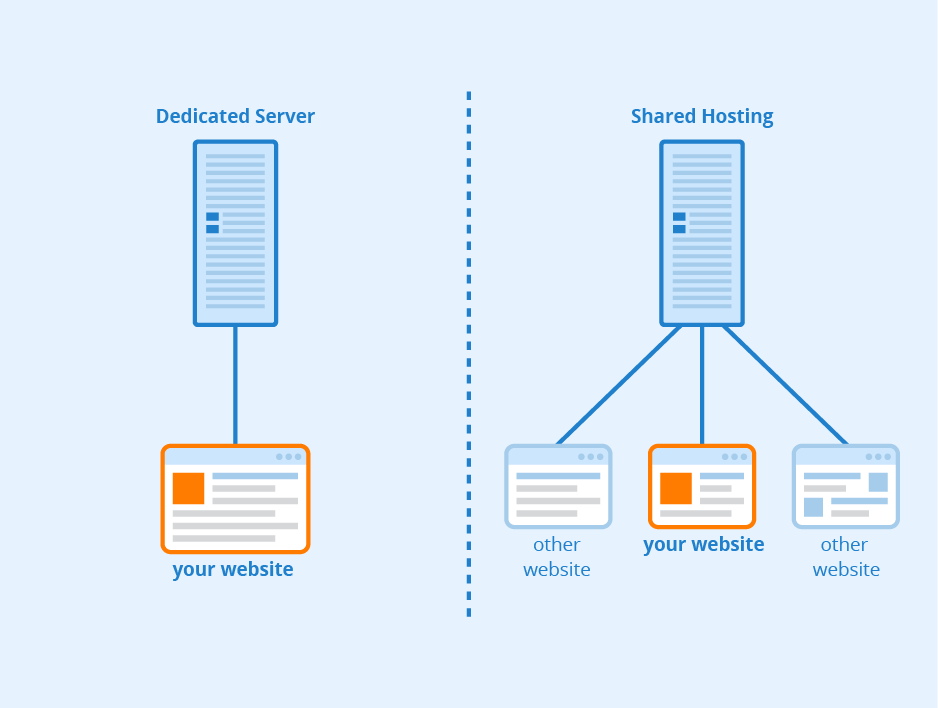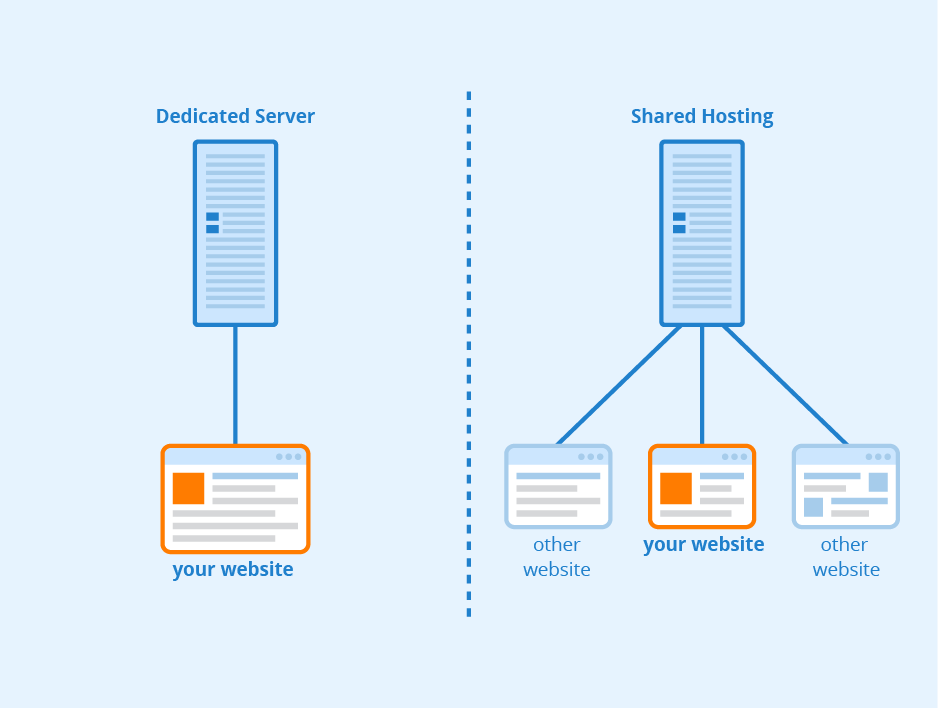Shared hosting and cloud hosting are both popular options for hosting websites. Shared hosting involves multiple websites sharing the resources of a single server, making it more affordable but with potential performance limitations. On the other hand, cloud hosting distributes resources across multiple servers, which offers flexibility, scalability, and better reliability. Cloud hosting also allows for easy scaling and resource management. Consider your website’s needs and budget to choose the best option for your business.
When it comes to web hosting, there are two popular options to consider: shared hosting and cloud hosting. Shared hosting is like renting a room in a crowded dormitory, with multiple websites sharing the same server resources. On the other hand, cloud hosting is more akin to a luxury hotel suite, where your website is hosted on a virtual server that draws resources from a network of interconnected servers. The difference between shared hosting and cloud hosting lies in the level of scalability, flexibility, and control they offer.
Shared hosting has been around for decades and is commonly used by small businesses and individuals who are just starting their online presence. It’s a cost-effective option that enables multiple websites to share the same server resources, including disk space, bandwidth, and processing power. However, shared hosting can be limited in terms of scalability and performance, as the resources are shared among all the websites on the server. On the other hand, cloud hosting provides greater scalability and flexibility by distributing resources across multiple servers, ensuring better performance, uptime, and the ability to handle spikes in traffic. It’s a popular choice for larger businesses and websites that require high availability and the ability to scale resources on-demand.

Shared Hosting vs Cloud Hosting: Understanding the Difference
When it comes to hosting your website, you have several options to choose from. Two popular choices are shared hosting and cloud hosting. Both options have their advantages and disadvantages, and understanding the difference between them can help you make an informed decision for your website.
Shared hosting involves hosting multiple websites on a single server. This means that resources such as CPU, RAM, and disk space are shared among the websites hosted on that server. On the other hand, cloud hosting utilizes multiple servers to distribute the workload and resources among various virtual machines.
One of the main differences between shared hosting and cloud hosting is the scalability. With shared hosting, you have limited scalability options since you are sharing resources with other websites. If your website grows and requires more resources, you may experience performance issues. However, with cloud hosting, you can easily scale your resources up or down based on your needs, ensuring that your website performs optimally at all times.
Additionally, with shared hosting, you have limited control over your hosting environment. You are often restricted in terms of customization and software installations. Cloud hosting, on the other hand, offers more flexibility and control, allowing you to customize your environment to suit your specific needs.
Another important aspect to consider is the reliability and uptime of your website. Shared hosting can be more susceptible to downtime due to the shared resources and potential issues caused by other websites on the server. In contrast, cloud hosting often provides better uptime and reliability as the workload is distributed across multiple servers.
Shared Hosting: Pros and Cons
Shared hosting is a popular choice for individuals and small businesses with budget constraints. Here are some of the pros and cons of shared hosting:
Pros:
1. Affordability: Shared hosting is generally more affordable compared to other hosting options, making it an ideal choice for those with limited budgets.
2. Ease of use: Shared hosting is user-friendly and often comes with a control panel that makes it easy to manage your website and hosting environment.
3. Technical maintenance: With shared hosting, the technical maintenance and server management tasks are taken care of by the hosting provider, allowing you to focus on your website content.
Cons:
1. Limited resources: Since resources are shared among multiple websites, you may experience performance issues if your website requires more resources or experiences a surge in traffic.
2. Limited control: Shared hosting often comes with limitations on customization and software installations, restricting your control over the hosting environment.
3. Potential security risks: If another website on the shared server is compromised, there is a risk that your website may also be affected, compromising the security of your site.
Cloud Hosting: Pros and Cons
Cloud hosting offers a more flexible and scalable hosting solution. Here are some of the pros and cons of cloud hosting:
Pros:
1. Scalability: Cloud hosting allows you to easily scale your resources up or down based on your website’s needs, ensuring optimal performance at all times.
2. Flexibility and control: With cloud hosting, you have more control over your hosting environment, including the ability to customize and configure the infrastructure as needed.
3. Reliability: Cloud hosting distributes the workload across multiple servers, reducing the risk of downtime and ensuring higher uptime and reliability.
Cons:
1. Cost: Cloud hosting can be more expensive compared to shared hosting, especially for websites with constant high traffic or resource-intensive requirements.
2. Technical complexity: Cloud hosting may require more technical knowledge to set up and manage compared to shared hosting.
3. Potential over-provisioning: If not managed correctly, there is a risk of over-provisioning resources in cloud hosting, resulting in unnecessary costs.
Shared Hosting vs Cloud Hosting: Which is Right for You?
Choosing between shared hosting and cloud hosting depends on your website’s specific needs and goals. Here are some factors to consider when making a decision:
1. Budget
If you have a limited budget and are just starting with a small website, shared hosting can be a cost-effective option. However, if budget is not a major constraint and you anticipate the need for scalability and higher performance in the future, cloud hosting may be worth considering.
2. Traffic and resource requirements
If your website experiences high or unpredictable traffic, or if it requires more resources (such as CPU, RAM, or storage) due to complex functionality or multimedia content, cloud hosting provides scalability and flexibility to meet those requirements. Shared hosting, on the other hand, may not be sufficient in such cases.
3. Control and customization
If you prefer to have full control over your hosting environment, and if customization and software installations are important to you, then cloud hosting is the better choice. Shared hosting typically comes with more restrictions in terms of customization.
4. Reliability and uptime
If uptime and reliability are critical for your website, especially if it’s a business or e-commerce site, cloud hosting is generally a safer option due to its distributed infrastructure.
Conclusion
Shared hosting and cloud hosting both have their own advantages and considerations. It’s important to weigh the pros and cons, consider your website’s specific needs, and determine which hosting option aligns best with your goals and budget.
In the end, the choice between shared hosting and cloud hosting depends on factors such as budget, scalability requirements, customization needs, and the level of control you want over your hosting environment. Assess your needs carefully and make an informed decision to ensure the optimal performance and success of your website.
Key Takeaways
- Shared hosting is when multiple websites share resources on a single server.
- Cloud hosting is when websites are hosted on virtual servers that draw resources from multiple physical servers.
- Shared hosting is usually more cost-effective, but cloud hosting offers more scalability and reliability.
- Shared hosting is ideal for small websites with low traffic, while cloud hosting is better for large websites with high traffic.
- Cloud hosting provides better security and backup options compared to shared hosting.
In summary, shared hosting and cloud hosting are two different types of web hosting services. Shared hosting is like living in an apartment complex, where multiple websites share resources on a single server. It is affordable but has limited flexibility and scalability.
On the other hand, cloud hosting is like living in a customizable and scalable house. It uses a network of virtual servers to provide resources for websites. It offers high reliability, scalability, and performance, although it may be slightly more expensive than shared hosting.

